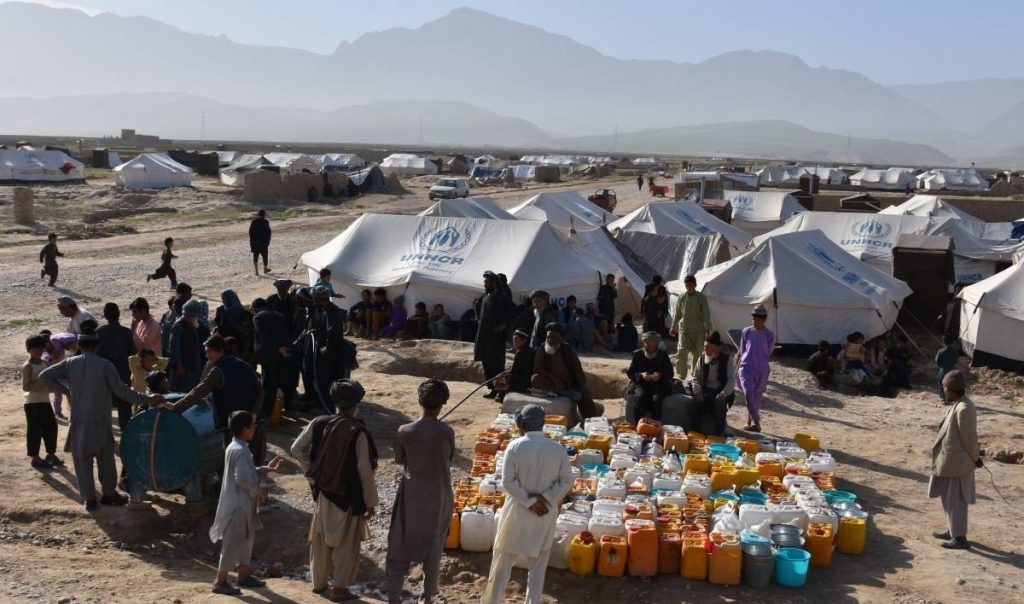The social and economic situation in Afghanistan has darkened since the emergence of the Taliban administration, resulting in severe economic insecurity for the population….reports Asian Lite News
The economic insecurity in Afghanistan has worsened under the Taliban rule, the United Nations Development Programme (UNDP) said in its latest report, Khaama Press said.
The UNDP report released on Sunday reveals that 69 per cent of Afghanistan’s population faces a shortage of necessities, including healthcare, essential goods, suitable living conditions, and vital job opportunities.
As per the report, the social and economic situation in Afghanistan has darkened since the emergence of the Taliban administration, resulting in severe economic insecurity for the population.
The UNDP report states that currently, seven out of every ten people in Afghanistan are unable to meet their basic life requirements and are grappling with economic insecurity, as per Khaama Press.
The organisation’s findings highlight the attack on women’s rights and its consequences, alongside the collapse of the banking system in Afghanistan, as undeniable setbacks that have raised serious concerns.
Since coming to power in Afghanistan, the Taliban has imposed severe restrictions on women, including bans on education and working with aid agencies, both domestic and international.
These restrictions have further aggravated the economic plight of the Afghan population, exacerbating an already dire humanitarian crisis in the country, as per Khaama Press.
Meanwhile, UNDP, in a report highlighted that Afghans are dealing with extreme hardships, and about 85 per cent of them live on less than one dollar a day, as reported by TOLO News.
According to the report, the situation became markedly worse after the Taliban took control over Afghanistan in August 2021, particularly for women who are currently facing severe restrictions that bar them from education and jobs.
Moreover, the latest UNDP research indicated that the real GDP of Afghanistan has declined by 29 per cent since 2020 and still continues to decline, TOLO News reported.
Reportedly, the decrees on women’s rights alone are estimated to have caused an economic loss between USD 600 million and USD 1 billion.
According to the report, UN Assistant Secretary-General and UNDP Regional Director, Asia-Pacific, Kanni Wignaraja, said that they aim at supporting women-owned businesses, job creation, and basic social services, among other goals.
“We focus on direct support to women-owned businesses, job creation, basic social services, renewable energy and disaster risk management to keep local economies running, ensure food and energy security, improve people’s wellbeing and protect them from disasters,” Wignaraja said.
Meanwhile, the World Food Programme (WFP) said that one in three Afghans do not know where their next meal will come from, as reported by TOLO News.
In its report, the WFP emphasised that it urgently needs USD 670 million to reach 15.2 million men, women and children with lifesaving food, nutrition, and livelihood support.
Stephane Dujarric, spokesperson for the UN Secretary-General, highlighted that the WFP warns that every province of Afghanistan is currently facing severe food insecurity.
“WFP warns that every province in the country is currently in crisis or worse levels of food insecurity. Previously, large-scale and sustained donor contributions helped carry millions of Afghans through two difficult winters and pulled back more than 5 million people from the brink of famine,” Dujarric said.
Moreover, the Ministry of Economy said that it is trying to solve the economic challenges by attracting investment and supporting domestic production and small businesses in the country, according to TOLO News.
The spokesman of the Ministry of Economy, Abdul Rahman Habib, said, “The Islamic Emirate tries to bring about employment and work opportunities and the gradual reduction of poverty through the coherence of national policies and programs.”
Earlier, the United Nations Office for the Coordination of Humanitarian Affairs (OCHA), said that 23.7 million people-more than half of Afghanistan’s population-will require humanitarian assistance to survive in 2024 as the country continues to reel from decades of war and grapple with climate-induced crises, recurrent natural disasters, entrenched poverty, and barriers to women’s participation in public life. (ANI)
ALSO READ: HRW Flags Human Rights Suppression in Afghanistan

